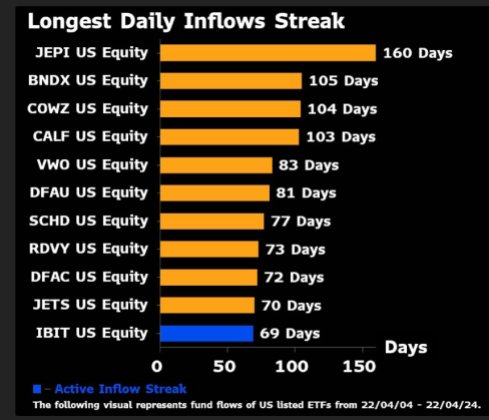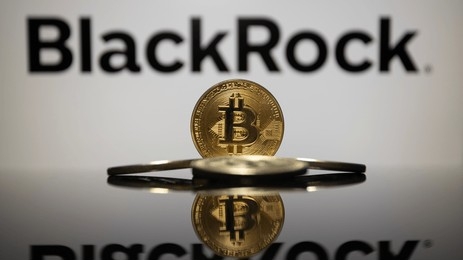The Bitcoin ETF market has witnessed a notable inflow streak, with BlackRock’s iShares Bitcoin Trust ETF (IBIT) leading the race. Since gaining approval from the US Securities and Exchange Commission (SEC) on January 10, the ETF market has experienced over three months of trading.
However, BlackRock stands out as the frontrunner, boasting an impressive inflow streak of 69 consecutive days, on the verge of setting a new record.
Bloomberg ETF expert Eric Balchunas highlights this achievement, underscoring the growing interest in BlackRock’s Bitcoin ETF and the overall adoption of the largest cryptocurrency in the market.
BlackRock’s Bitcoin ETF Nearing Top 10 List
BlackRock’s iShares Bitcoin Trust ETF has consistently attracted inflows for 69 consecutive days, inching closer to a new record. Balchunas points out that the ETF will enter the top 10 list with just one more day of inflows and tie with the airline JETS ETF.

Delving into the inflow data, IBIT has witnessed an average inflow of $223.4 million during April trading. Farside data reveals that the ETF recorded a maximum inflow of $849 million and a minimum inflow of $18 million.
In comparison, the runner-up in the spot Bitcoin ETF race, Fidelity’s FBTC ETF, experienced an average inflow of $118 million in April, with a maximum of $473 million.
It is worth noting that Fidelity’s ETF experienced zero inflows for three days in April (April 12th, 15th and 17th). Meanwhile, most of the other eight ETFs recorded zero inflows for more than eight days in April, highlighting the strong investor interest in Fidelity and BlackRock’s Bitcoin ETFs.
In contrast, the Grayscale Bitcoin Trust (GBTC) experienced significant outflows over the past three months, losing almost 300,000 Bitcoin. In April alone, GBTC recorded total outflows exceeding $1.6 billion. On the other hand, BlackRock’s Bitcoin ETF has gained similar Bitcoin inflows during the same period.
In light of these developments, Grayscale appears to be taking action to boost performance and inflows to the firm’s assets under management (AuM).
Grayscale Introduces Low-Fee “Mini Bitcoin ETF”
Grayscale has revealed plans to launch a new spin-off version of its GBTC fund, a “Mini Bitcoin ETF,” with a significantly reduced fee of 0.15%. According to Grayscale’s latest filing, this fee is expected to be the lowest among all available spot Bitcoin ETFs.
The move can be seen as a strategic response to Grayscale’s recent challenges, including the absence of inflows into its flagship product due to its current high 1.5% fee.
With the forthcoming launch of the Bitcoin Mini Trust, which features a competitive 0.15% fee, Grayscale aims to regain its popularity among investors. Presently, the Franklin Bitcoin ETF (EZBC) holds the title for the lowest-cost Bitcoin ETF, with a fee of 0.19%.
BTC is trading at $66,300, up 2% over the past 24 hours.
Featured image from Shutterstock, chart from TradingView.com









